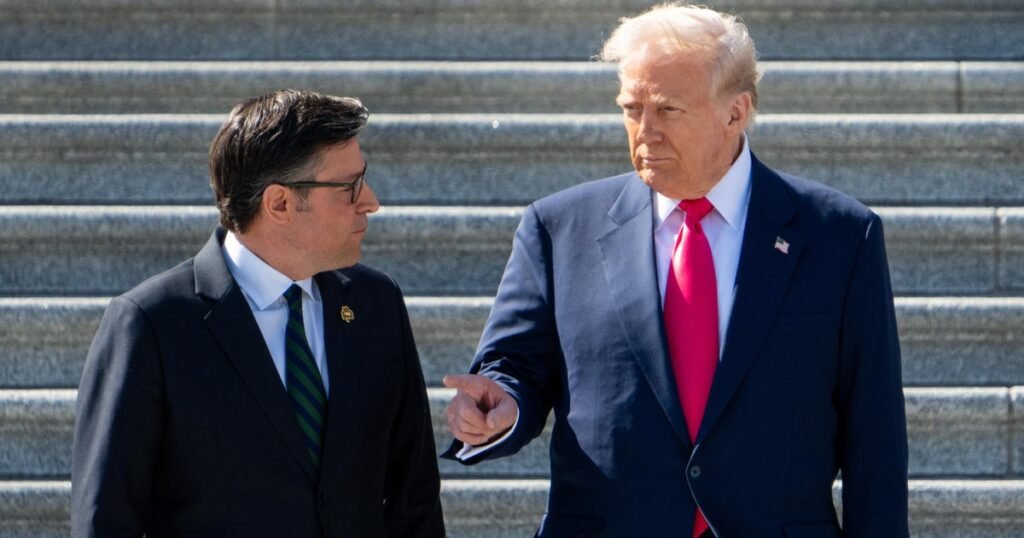
Washington — The Senate’s budget resolution, which has been backed by President Trump and is key to extending his tax cuts, is opposed by a number of House Republicans who say it doesn’t cut enough spending.
The House must adopt the Senate-passed resolution to move forward on the president’s agenda, and GOP leaders hoped to take that vote this week. But nearly a dozen House Republicans say they oppose the resolution or have serious concerns about the $1.5 trillion gap between the House and Senate versions. Speaker Mike Johnson’s slim GOP majority means he can afford to lose the support of just three Republicans.
The president is meeting with Republican holdouts on Tuesday as Johnson tries to coax them to back the 70-page resolution, the blueprint for implementing Mr. Trump’s border security, defense, energy and tax priorities. Although Johnson has in the past been able to overcome pockets of opposition, this time, he faces objections from multiple corners of the GOP conference.
House leaders aren’t ruling out working through the weekend if they’re unable to push the resolution through the lower chamber this week. Congress is scheduled to be in recess the next two weeks.
The president endorsed the Senate-adopted budget resolution Monday night, saying in a post on Truth Social that it includes all of “the elements we need to secure the Border, enact Historic Spending Cuts, and make Tax Cuts PERMANENT.”
“There is no better time than now to get this Deal DONE!” Mr. Trump continued, adding that “THE HOUSE MUST PASS THIS BUDGET RESOLUTION, AND QUICKLY.”
Bill Clark/CQ-Roll Call, Inc via Getty Images
The budget plan is the first step in the reconciliation process, which allows Congress to bypass the 60-vote threshold required to advance most legislation in the Senate.
The Senate adopted the compromise resolution Saturday after Republicans in the House and Senate had forged ahead on their own budget blueprints earlier this year. But both chambers must adopt identical budget resolutions to kickstart the broader reconciliation process, prompting GOP leaders to come together on the path forward in recent weeks.
Still, the resolution doesn’t address disagreements over where and how to make substantial spending cuts, pushing a confrontation further down the road.
In the resolution, the Senate set relatively low minimum floors for spending cuts for several committees, at just about $4 billion dollars, though they expect to find far more. At the same time, it allows for House plans to cut at least $1.5 trillion in spending. Some House Republicans argue the spending cuts aren’t deep enough.
The Senate’s plan relies on a budget scoring method known as “current policy,” which assumes that continuing current policies incurs no cost. Under that baseline, the $3.8 trillion it would cost to extend the Trump tax cuts would not be counted.
But the tax cuts were originally passed using “current law” scoring, which treats the renewal of expiring policies as new legislation. The House budget resolution relied on the current law baseline and acknowledges that continuing the tax cuts will cost $3.8 trillion. The 2017 Trump tax cuts are set to expire this year, and if they are not extended, taxes will go up for many filers.
House Republican leaders are still barreling forward with the Senate-adopted plan, meeting with skeptical Republicans, while the White House seeks to apply pressure of its own.
Johnson told reporters he was meeting with the House Freedom Caucus Monday night, after the conservative group’s chairman, Rep. Andy Harris of Maryland, advocated for the chamber to move forward on the president’s agenda without the budget resolution.
“It needs to at some point in the future. It doesn’t need to be right now,” Harris said of the resolution’s adoption.
Republican Rep. Chip Roy of Texas also advised against holding a vote this week.
“They literally produced a budget that will have deficits going up,” Roy said Tuesday. “That’s what they did. I didn’t come here to make deficits go up. The Senate apparently did.”
House Majority Leader Steve Scalise acknowledged the hurdles ahead at the GOP leadership’s news conference Tuesday morning, saying “nobody said it would be easy.” But the Louisiana Republican added that “our commitment is firm in getting this done.”
“There are members that have questions — that’s not a surprise,” Scalise said. “Our job is to continue answering those questions while moving the ball forward. But it’s critical that we advance this agenda, that we don’t delay, because passing the budget doesn’t end the process, it starts the reconciliation process.”
Johnson stressed that “the budget resolution is not the law,” noting that “all this does is it allows us to continue the process, begin drafting the actual legislation that actually counts — and that’s the one big beautiful bill.”
The speaker said adopting the resolution simply “allows us to get off the sidelines and get on the field and start this game.”
“It’s the kickoff,” he added.
contributed to this report.





